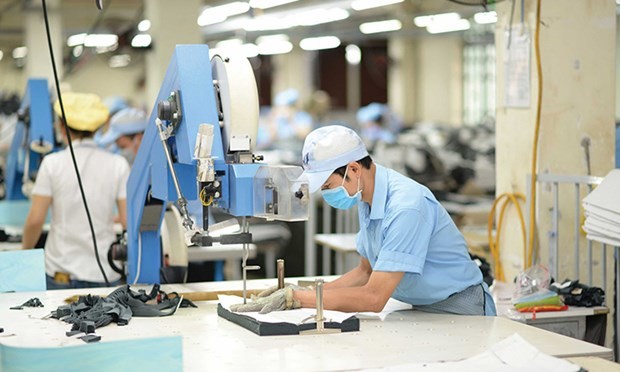 Enterprises in the textile, garment and footwear industries are facing difficulties on a variety of fronts, including a reduction in export orders. (Photo: VNA)
Enterprises in the textile, garment and footwear industries are facing difficulties on a variety of fronts, including a reduction in export orders. (Photo: VNA)
Pham Van Viet, Chairman of Viet Thang Jean Co., Ltd., reported that orders at his firm have decreased since June. He said that orders are waning in key markets, adding they are down some 60 percent in Europe and 30-40 percent in the US market.
Currently, Viet Thang is operating at only 80 percent of its designed capacity. Because customers cancel orders in light of high inventory, Viet Thang always has to closely follow market information.
To maintain operations and ensure employees' income, the company is looking for orders in new markets. Orders are coming in from Canada and Australia, but they have not been able to offset the decline from the US and European markets, he said.
Other businesses in the footwear industry are also facing similar problems.
Nguyen Chi Trung, Chairman of the Board of Directors of Gia Dinh Group Joint Stock Company, said most markets have reduced orders by 30-40 percent compared to the same period in 2021. This trend is likely to continue, with orders likely to decline further in the coming months.
Due to a reduction in export orders, the company’s workers must now alternate shifts, he said, adding that it has nearly 5,000 employees.
Enterprises in most sectors said that import and export activities in the second half of the fourth quarter of 2022 and the beginning of 2023 will face many difficulties compared to the third quarter of this year. Key export industries are forecast to witness a large decrease in orders, especially textiles, footwear, furniture, iron and steel and cement. Currently, many businesses have to reduce the number of workers and production scale to wind down in the last months of 2022.
Phan Thi Thanh Xuan, Vice President and Secretary General of the Vietnam Leather-Footwear and Handbag Association (Lefaso), said that it is necessary for manufacturing enterprises to diversify the markets in the context that export markets are shrinking and demand is on the decline.
Lefaso is coordinating with the Ministry of Industry and Trade to deploy trade promotion programs to support businesses to access more markets.
Businesses must improve their competitiveness to take full use of the advantages brought about by free trade agreements, Xuan said, adding that they are expected to have a development strategy for the textile and footwear industries which will enable the two sectors to develop appropriate production and business development plans in the coming time.
























